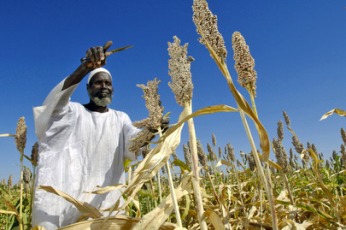UNHCR and FAO launch self-reliance initiative in Eastern Sudan
September 01, 2015 (KHARTOUM) – The United Nations Food and Agriculture Organisation (FAO) and its refugee agency (UNHCR) have agreed with the Sudanese government on an initiative to enhance self-reliance of refugees and asylum-seekers in Eastern Sudan through skills-building and sustainable rural livelihood strategies.

A joint statement issued on Tuesday said the project will enable low-income households meet local market needs by providing skills development in sustainable agriculture and livestock production.
Through the project, hands-on training will reportedly be provided to refugees and asylum seekers in land preparation, production and harvesting processes for sorghum, sesame, horticulture, fodder and poultry, production, packaging as well as marketing best practices.
“This project comes at a critical time. Eastern Sudan is facing a protracted refugee situation that is characterised by limited humanitarian aid resources, a lack of livelihood supports and chronic poverty in the refugee camps there,” said the FAO representative on Sudan, Abdi Jama.
“The project is an important component of FAO and UNHCR’s joint efforts on a renewed Self-Reliance Strategy to address the situation by enhancing economic self-reliance in order to reduce refugee aid dependency and promote a sustainable co-existence between the refugees and host communities in Eastern Sudan,” he added.
The eastern part of Sudan remains one of the most protracted refugee situations worldwide, but reportedly witnesses an ongoing influx of new arrivals with an average of 1,100 individuals per month being registered at the border entry points in Sudan so far in 2015.
Since the 1960s, however, the semi-arid region has generously hosted more than 1.5 million refugees, while also being one of the poorest in Sudan according to a 2009 national poverty assessment.
Currently, the UN says, there are more than 90,000 refugees living in the region’s nine active refugee camps and urban areas in Kassala, El Gezira and Gedaref states. The majority of refugees who are from a protracted caseload have lived in the region for up to 40 years, with close to 60% of the camp population having been born in Sudan.
Nearly 50% of refugees and asylum-seekers in Eastern Sudan are estimated to live in chronic poverty, the UN said in its joint statement.
“Refugees are often seen as passive recipients of aid, and an economic burden to the host communities, but in reality, the refugee population is not homogeneous. Although in extreme poverty, some are ready to build on their livelihood assets. Through this project, UNHCR will look at each refugee carefully, and assure that the right assistance reaches the right persons, based on not only their vulnerabilities but also on the capabilities of each refugee,” said the UNHCR’s representative in Sudan, Mohammed Adar.
There have also been concerns, over the lack of sustainable livelihood opportunities in Eastern Sudan, which has reportedly contributed in pushing new arrivals to engage in onward movement.
“FAO is well-placed to address the livelihood challenges that refugees and asylum seekers in the region face,” said FAO’s Jama.
“By providing people with the skills and tools they need to increase agricultural and livestock production, this project will benefit entire households and will help pave a way out of chronic poverty and steer these communities toward a more sustainable and healthful future,” he stressed.
FOOD SECURITY PROVISION
Since 2006, the UN food agency has reportedly provided food security and livelihood supports to refugees and asylum-seekers in Sudan, with projects currently underway in White Nile and South Kordofan states to support South Sudanese arrivals.
The project, in its pilot phase from August to December 2015, will reportedly target refugees and asylum-seekers living in the Fau 5, Kilo 26 and Um Gargour camps. Upon successful implementation of the pilot, should additional resource be available, the project can be replicated to other camps, as well as to the host communities, with a particular focus on local value chain development and partnership with private sectors.
“With increasingly limited resources available, a strong collaboration and partnership among all the concerned parties towards a common objective will be more and more important in the East”, said Adar.
“The pilot project is an important investment to show that the humanitarian assistance to the refugees, if provided correctly in good partnership with the Government and the right development partners, can positively contribute to the socioeconomic development in the region,” he added.
(ST)
